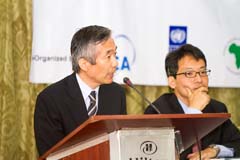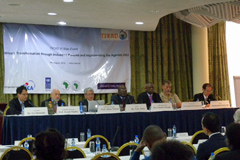JICA-RI and IPD at Columbia University Joint Research Outcome Discussed at TICAD VI
2016.09.02
On August 26, the JICA Research Institute held the side event "Africa's Transformation through Industrial Policies and Implementing the Agenda 2063" at the Sixth Tokyo International Conference on African Development (TICAD VI) in Nairobi, Kenya. The seminar was co-organized by the United Nations Development Programme (UNDP), the African Development Bank (AfDB) and the Initiative for Public Dialogue (IPD) at Columbia University led by Joseph Stiglitz of Columbia University. JICA-RI Director Naohiro Kitano and Visiting Research Scholar Go Shimada participated in the side event.
In his opening remarks, JICA President Shinichi Kitaoka pointed out industrialization can play an important role in the various challenges Africa faces today, such as income gaps and unemployment. He shared an example of industrialization from Meiji era Japan when the export industry grew into a success. He also introduced JICA's KAIZEN initiatives and the African Business Education Initiative for Youth (referred to as the ABE Initiative), which provides opportunities for students from Africa to have higher education and do internships in Japan.
Professor Joseph Stiglitz introduced the content of the books "Industrial Policy and Economic Transformation in Africa" and "Good Growth and Governance in Africa," both of which are the results of joint research between IPD and JICA-RI. He stressed the importance of establishing a "learning society" as a strategy to promote structural transformation and create jobs in Africa. He also pointed out how this would be important in promoting Africa's dynamic comparative strengths, and referenced good practices from JICA's KAIZEN projects.

JICA-RI Director Naohiro Kitano (left) and Visiting Research Scholar Go Shimada
Next, Helen Clark, UNDP Administrator, listed the following as priority areas for industrialization and economic transformation: investing in people; unleashing the great potential of Africa's youth; nurturing a responsive developmental state, with a strong focus on shared prosperity; taking advantage of Africa's strong natural resource base while maintaining ecosystem integrity; and supporting regional integration. Charles Boamah, vice president of the AfDB, talked about the Strategy for the African Industrialization that the AfDB launched in July.
The ensuing panel discussion was moderated by Shimada. The panelists, including Stiglitz, Akbar Norman, a professor from Columbia University, Yaw Ansu, chief economist at African Center for Economic Transformation, Célestin Monga, appointed vice president and chief economist of the AfDB, Jomo Kwame Sundaram, former U.N. assistant secretary-general for economic development and Kenichi Tomiyoshi, vice president of JICA, discussed obstacles to structural transformation in Africa and the policies necessary to overcome them.
Based on the experience of economic transformation in Thailand, Tomiyoshi pointed out the importance of government having long-term industrial policies and plans. Other panelists brought up the need to introduce broad-ranging industrial policies, including development finance and exchange rate policies, innovation based on industrial agglomerations, and development planning on the basis of a trading system.

Visiting Research Scholar Shimada (left) moderates a panel discussion
In his closing remarks, Kitano emphasized the importance of the nexus between practice in the field and research, and the role of JICA-RI as a catalyst to bridge the two stages. He concluded that JICA-RI will continue to work on the theme of Africa's structural transformation with a special focus on the latest research agenda of "Quality Growth," undertaken in partnership with IPD.
On the following day, another meeting was held with authors involved in the fourth JICA-RI and IPD joint research project "Quality Growth in Africa." Norman chaired the meeting. After a speech by Stiglitz, Kitano gave a presentation entitled "Roles of East Asian Countries for Realizing Africa's Quality Growth."
Monga and seven authors reported on the progress of the research. Then Shimada gave a presentation on global environmental problems and local environmental pollution entitled "Global Impacts and Local Impacts of Environment Problem - Toward Green Industrial Policies." He argued that in transforming the economic structure, there is a need to carry out a green industrial policy that takes the environment into consideration. The other authors gave presentations and exchanged opinions on such topics as the effects of trade agreements on industrial policy, economic complexity and its relationship to growth, a well-being index as an alternative to GDP, and intellectual property rights.

事業事前評価表(地球規模課題対応国際科学技術協力(SATREPS)).国際協力機構 地球環境部 . 防災第一チーム. 1.案件名.国 名: フィリピン共和国.

事業事前評価表(地球規模課題対応国際科学技術協力(SATREPS)).国際協力機構 地球環境部 . 防災第一チーム. 1.案件名.国 名: フィリピン共和国.

事業事前評価表(地球規模課題対応国際科学技術協力(SATREPS)).国際協力機構 地球環境部 . 防災第一チーム. 1.案件名.国 名: フィリピン共和国.

事業事前評価表(地球規模課題対応国際科学技術協力(SATREPS)).国際協力機構 地球環境部 . 防災第一チーム. 1.案件名.国 名: フィリピン共和国.

事業事前評価表(地球規模課題対応国際科学技術協力(SATREPS)).国際協力機構 地球環境部 . 防災第一チーム. 1.案件名.国 名: フィリピン共和国.
scroll